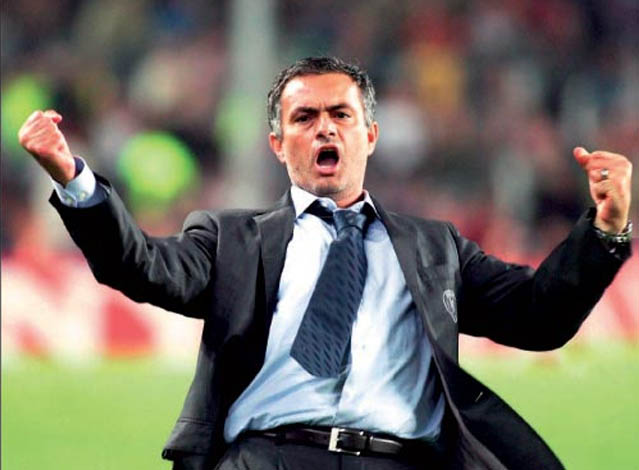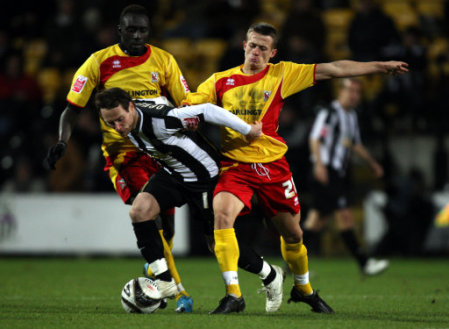-
Recent Articles
The Midfielder as Centerback
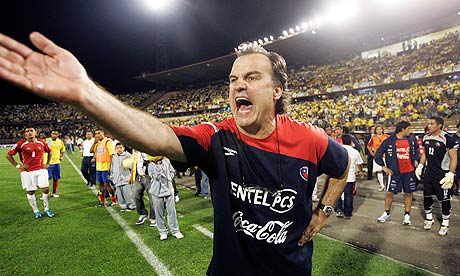 Marcelo Biesla and Josep Guardiola are both managers who play a very high line with their respective sides and who both demand that all players be technically proficient with the ball. Part of playing...
Marcelo Biesla and Josep Guardiola are both managers who play a very high line with their respective sides and who both demand that all players be technically proficient with the ball. Part of playing...Understanding the 4-4-2 Diamond
DEFENCE Despite the fact that there are four ways to play a diamond formation on FM, the differences between them are few and usually subtle. As a starting point, one thing each of them do have...3 at the back and the 4-4-2 Diamond
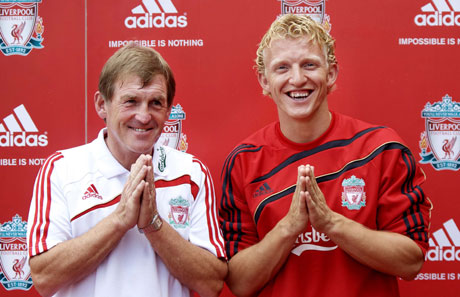 Last week Chelsea v Liverpool became the biggest tactical talking point of the season. Liverpool revived the the 3 man defence that Kenny debuted against Stoke. While with the introduction of Torres for £50m...
Last week Chelsea v Liverpool became the biggest tactical talking point of the season. Liverpool revived the the 3 man defence that Kenny debuted against Stoke. While with the introduction of Torres for £50m...How To Set Up A Back Four
 Last year, I wrote a guide about how to play a simple 4-4-2. One of the major components of that is the back four. In fact, most modern formations build upon four defenders; two full backs and two centre...
Last year, I wrote a guide about how to play a simple 4-4-2. One of the major components of that is the back four. In fact, most modern formations build upon four defenders; two full backs and two centre...Building Your Defence: Full Backs
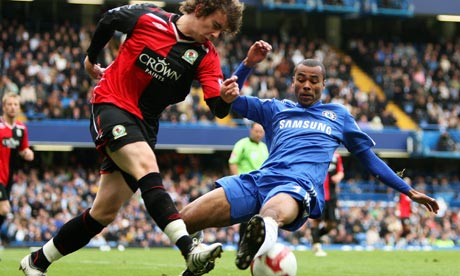 The modern full back is quickly becoming one of the most important players on the team sheet, infact even back in the days of Brian Clough, fat ed' argued that because of the space these players get in the final...
The modern full back is quickly becoming one of the most important players on the team sheet, infact even back in the days of Brian Clough, fat ed' argued that because of the space these players get in the final...
JOIN 1,187 READERS - SUBSCRIBE NOW TO OUR FOOTBALL MANAGER NEWSLETTER
Get the latest FM news & best community content delivered directly to your e-mail inbox!
Lessons From Hinckley: Experienced Players Win Promotions
Written by: Gareth Millward
Category: Players
Posted on: February 1, 2010
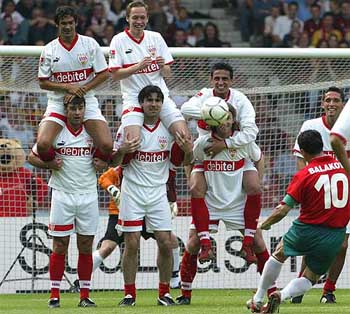
February 1, 2010
Thomas Levin wrote about aging playmakers on his site FM Pundit last month. Can older players really make the difference? Well, in the case of my career save, it was certainly the experience of one player that helped gain promotion from the Blue Square North league.
At the lower levels, technical and mental skills can be at a premium. In fact, all skills are at a premium. You can often find a striker with nothing more than 16 for acceleration can grab 20 goals a season simply by virtue of creating a hat full of chances by out-sprinting the opposition centre backs. Or a 6′ 4″ centre back with 18 for jumping can be a beast at set pieces, defensively and offensively.
An older player who has been at a higher level, however, will have a lot more technical and mental skills than other players in your league - even if physically they may not be in the best shape.
Older players have “experience”
Many commentators in football talk about “experience”. In Football Manager, this is best expressed through the mental stats in the player’s profile. Mental stats continue to improve long after physical and technical attributes reach their peaks. Never underestimate the power of things like positioning, composure, concentration and decision making. These sorts of traits continue to develop well into a player’s 20s, and can make up for a lack of technical or physical skill.
If a player is more likely to make the right passing decision, he doesn’t need great passing to pull off an audacious pass - he’ll just look for the simpler one.
If a player has great positioning, he doesn’t need great pace to cover an opposition forward - he can just walk into the right place to give himself maximum defensive efficiency.
So, experience in this sense is very useful, especially at the lower leagues where small changes in skill levels can make a big difference. Your scouts, given enough time, may be able to give you more information about hidden attributes which can also affect the way the player behaves. “Professionalism” for example is something that players at the higher levels are much more likely to have than those who have spent most of their lives in the lower leagues.
The Example
In this series of articles, I will use examples from my current career save. In this instance, I will show the example of Sylvain Legwinski, ex-Fulham and France midfielder with a wealth of experience. I signed him for Hinckley early in my first season.

This screenshot comes from the fourth season of the career - so, obviously, with an acceleration of 1 Sylvain is no spring chicken. But even when I signed him, his acceleration was around 5. So, why pick a player who has such poor physical stats?
When I signed him, he was plying his trade in at St. Neots, a team not even in the playable leagues (unless you’ve been fiddling with the editor). But he had stats of 13 and above in a number of areas. Unlike most of my squad (who may just about reach 10 for some of the key attributes for their position), Legwinski was, technically and mentally, good enough to play in the Football League. Indeed, by the end of the second season I was fending off enquiries from Hereford United in League Two.
This gave him the ability to pick a pass and hit a long shot unlike anyone else in my squad - maybe anyone else in the league.

On the down side, Legwinski was incredibly injury prone. And unfit. Despite only playing him one game a week when he first arrived, it didn’t take long for him to need an extended rest. By the second season, I was only able to play him for 60-70 minutes a week.
That meant I had to make the choice of whether to play him in the Wednesday night fixture against a promotion rival, or in the FA Cup game at the weekend!
Despite this, Legwinski managed around 30 league games a season, averaging over 7.00 a game. But why?
When a player can pass the ball well and make the right decisions, it is of less concern whether he is quick over 10 yards or not. Especially when he plays in a position like centre midfield where pace is not a key attribute. Besides - he has a partner in the midfield who can cover for him in the event that he does get caught out of position.
Not that this is likely to happen too often, since his experience gives him such good positioning skills that he can read the game so well. The following highlights from one of his games in season two show that age is no barrier to creating problems in the lower divisions.
Download Hinckley United v Worcester.pkm (right click and “Save target as”)
Obviously, a player with such low fitness and speed is never going to be a great winger. Nor is he going to be a prolific striker. But the creativity that he can provide in midfield is something you will not get from players who don’t have experience of a higher level.
I used Sylvain as a ball-winning midfielder in my tactics, with a more energetic box-to-box midfielder alongside him in a simple 4-4-2. That gave the tactic balance, but also added energy and drive to the midfield. It gives the side a choice, as well - power through with a more pacey central midfielder, or use the skill and touch of Legwinski to find good through balls.
As you will see in the analysis screens in this PKM, Gooding’s passes, tackles and interceptions show far more movement than Legwinski’s.
So - this is what I’ve learned at Hinckley. In future weeks, I will talk more about various tactical elements that have been highlighted by my career save, including more examples and discussions.
About The Author: Gareth Millward
Member of the FM-B Think Tank and one of the main authors and editors of FM-B’s tactical guides and e-books, Millie organises the content for the main site. He has a particular interest in the history of football tactics (probably because in real life he is an historian) and in recreating real-world football in the FM match engine.
Download Our Tactical Theorems '10 eBook Absolutely Free

Presenting the most comprehensive tactic design and match strategy guide to the Football Manager series ever created!
Written by FM match engine beta testers, it's 60+ pages of easy-to-read concepts and ideologies for getting your team playing exactly how you want each match! It's been downloaded over 100,000+ times to date!
Find out more information about our tactical eBook
and download Tactical Theorems '10 right now!
Written by FM match engine beta testers, it's 60+ pages of easy-to-read concepts and ideologies for getting your team playing exactly how you want each match! It's been downloaded over 100,000+ times to date!
and download Tactical Theorems '10 right now!
Web discoveries
- UK Casinos Not On Gamstop
- Online Casinos UK
- Best Slot Sites
- Non Gamstop Casinos
- Casino Sites Not On Gamstop
- UK Online Casinos Not On Gamstop
- Slots Not On Gamstop
- Non Gamstop Casino UK
- Non Gamstop Casino UK
- Casino Sites Not On Gamstop
- UK Online Casinos Not On Gamstop
- Casinos Not On Gamstop
- Gambling Sites Not On Gamstop
- Non Gamstop Casinos
- Non Gamstop Casinos
- Non Gamstop Casino UK
- UK Casino Not On Gamstop
- Casino Sites Not On Gamstop
- UK Online Casinos Not On Gamstop
- UK Online Casinos Not On Gamstop
- Brand New Casinos Not Blocked By Gamstop



